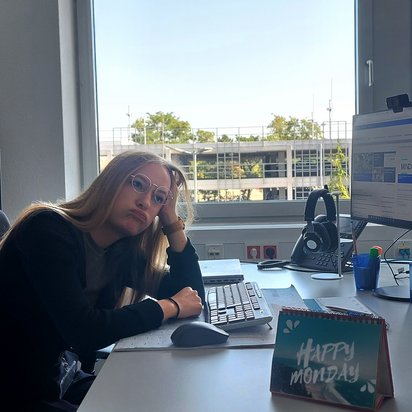Gibt es den Montagsblues wirklich?
Der Montagmorgen ist für viele der Tiefpunkt der Woche, aber gilt das wirklich?

Der Montagmorgen ist für viele der Tiefpunkt der Woche, aber gilt das wirklich?

Monday morning is the low point of the week for many people: work is calling and the next weekend is still a long way off. Back in the early 1950s, a survey named Monday as the most unpopular day of the week. “Nothing has changed to this day,” says Dennis Dal Mas from the Medical-Psychological Institute of TÜV NORD in Bielefeld. And the statistics show: There are a few good reasons for this dislike.

The frustration starts in the morning: when commuting by train, for example, you have to expect more delays at the beginning of the week. Trains are most unpunctual on Mondays and Tuesdays, as the statistics company Statista calculated in 2019 using the example of selected cities. The opposite is true for car accidents on the road: most of them occur on Fridays. However, most accidents at work are reported on Mondays, according to statistics from the German Social Accident Insurance.
Medical studies also point to increased stress on Mondays. One of them followed almost 4,000 men in the Canadian Air Force over a period of 50 years. More than 200 of them suffered a sudden cardiac death during this time, a good fifth of them on Mondays - significantly more than the statistically expected seventh. There was no increased mortality rate for other causes of death on Mondays.
Body has to switch from rest to work
The Canadian researchers suspect that the heart is under particular stress on Mondays because the body has to switch abruptly to a compulsory program after the leisurely weekend: stress hormones are released, pulse and blood pressure rise. This is also supported by the fact that the working population in particular suffers more heart attacks on Mondays. According to a Dutch study, the risk of sudden cardiac death on Mondays is less increased after retirement age. According to statistics from Belgium, the Monday peak is most pronounced in the age group from late 30s to early 40s - but only in the case of non-fatal heart attacks. This could point to an alternative explanation: Do some people possibly only go to the doctor on Monday after a mild heart attack at the weekend because they don't want to go to the emergency room?
The heart attack statistics do not provide a clear answer. However, there are other indications of particular stress at the beginning of the week. In a study in Japan, blood pressure rose on Mondays, mainly in working test subjects. Diary entries by employees also confirm this: Stress at work is at its highest at the beginning of the week.
However, this is only slightly reflected in the rest of their emotional state. As expected, the mood is best at the weekend, according to a telephone survey of 340,000 people in the USA. But compared to the other working days, the mood on Mondays was not much worse.
A meta-analysis also found only a weak Monday low. People do believe that their mood plummets on Mondays, reported emotion researcher Charles Areni. But in retrospect, the last Monday doesn't seem as bad as expected. And if you ask people on weekdays themselves, their mood is only slightly worse on Mondays. So is there no such thing as the Monday blues?
Sleep rhythm plays an important role in well-being
It is possible that it is not so much mood that is in a slump as performance. This is the conclusion reached by a team led by psychologist Oliver Weigelt from the University of Leipzig following a study of employees: They showed an abrupt drop in energy on Mondays in particular. The Monday fatigue was linked to the change in sleep patterns, they hypothesized. In addition, the prospect of the next working week can disturb sleep.
Expectations play a major role in stress management. “We can deal better with stress on Friday because we know Just a few more hours and then it's the weekend,” explains Dennis Dal Mas from TÜV NORD. On Mondays, there is no rest in sight for the time being, on the contrary: the whole week is still to come. That's why it's particularly important to plan restorative breaks, says the psychologist with a doctorate. He recommends making regular appointments to have a coffee or go for a walk during the lunch break on Mondays: “Nice contacts are an emotional buffer.”
Founded over 150 years ago, we stand for security and trust worldwide. As a knowledge company, we have our sights firmly set on the digital future. Whether engineers, IT security experts or specialists for the mobility of the future: in more than 100 countries, we ensure that our customers become even more successful in the networked world.